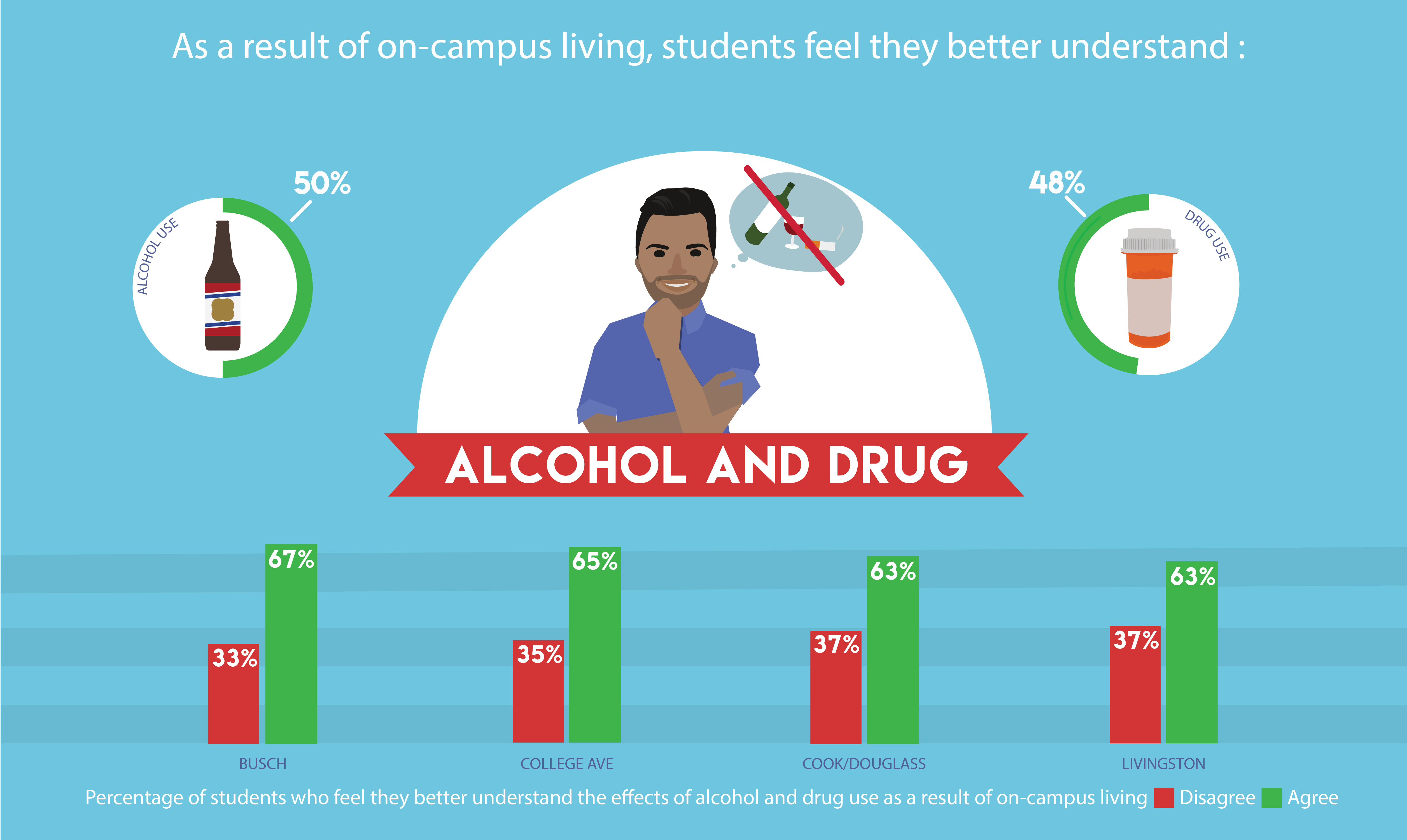What is the Residential Student Experience Survey?
Every two years, Residence Life administers the Residential Student Experience Survey to collect information about on-campus living and enhance the student experience. In 2020, the survey will focus on residential students currently assigned to traditional and suite-style rooms. The survey takes less than 30 minutes to complete.
Scroll on to see the 2016 survey results.
When does the survey open?
The Residential Student Experience Survey will open at 2 am on February 12, 2020 and will close at 11:59 pm on March 10, 2020.
Where can I access the survey?
On February 12, all eligible residents will receive an email with a link to access the survey. Each link is unique and should not be shared among residents. Please note, the email may be marked as spam. Can’t find the survey? Residents will receive three reminder emails throughout the duration of the survey. You can also ask your RA and we will send you a new email.
*Residents with multiple email addresses should check all accounts when searching for the survey email (i.e. echo, Scarletmail, Gmail, Yahoo, etc.).
Contest Rules
Only students currently living in traditional or suite-style rooms are eligible to participate in the survey. Residents who complete the survey by 11:59 pm February 14, 2020 will be entered into a random drawing to win one of two $100 Amazon gift cards.
Residents who complete the survey February 15-March 10 will be entered into a random drawing to win one of twelve $50 Amazon gift cards. One gift card will be awarded per week per campus (Busch, College Avenue, Cook/Douglass, and Livingston).
What if I need more information?
You may contact us at oncampus@rutgers.edu with any additional questions or concerns.
2016 Residential Student Experience Survey Results
In 2016, administrator of the Residential Student Experience Survey (also known as ACUHO-I EBI) identified five factors as having the most impact on overall student learning, student satisfaction, and program effectiveness. Based on that recommendation and the survey results, Residence Life decided to focus on those five high-impact factors in an effort to improve our residents’ overall experience.
Below is a brief overview of the 2016 Residential Student Experience Survey, process for closing the assessment loop, our five factors, outcomes, and campus action plans:
Demographics
- Over 9,000 Rutgers undergraduate students residing in traditional residence halls and suites were invited to participate
- 64% overall response rate
- Survey included 135 demographic/biographic, open-ended, and scaled questions
- Scaled questions were grouped into 20 different factors based on various themes
- Gender (Female: 55.8% and Male: 43.3%)
- Race/Ethnicity (White/Caucasian: 36.5, Asian: 36.3, Hispanic/Latino(a): 10.3 and Black/African American: 8.6)
- Class standing (1st year: 61% and upper class: 38.7%)
- 57% of respondents reported that most of your family or at least your parents were born outside the U.S.
How is the Information Utilized?
- Assessment committee reviewed and analyzed results.
- Department decided to focus on five high impact factors based on the committee’s preliminary report.
- Committee created an action planning template and presented to the staff with the results and recommendations.
- Each campus staff, including RAs/AAs, participated in formulating their action plan(s).
Factor 1: Personal Interactions
Learning about Personal Interactions is the most impactful factor that students can benefit from living on-campus. Students were asked four related questions to gain insight to their learning as a result of their on-campus experience about the following:
- Meet other people
- Live cooperatively
- Resolve conflicts
- Improve interpersonal relationships
Although all of these areas are important, priority for this year’s action planning has been given to Resolving Conflicts within Personal Interactions:

Factor 2: Self-Management
Self-Management is the second most impactful learning that students can gain as a result of their living on-campus. Students were asked five related questions to gain insight to their learning as a result of their on-campus experience about the following:
- Manage your money
- Manage your time
- Solve your own problems
- Balance your social, work and academic commitments
- Live a healthy life (e.g., sleep, exercise, diet)
Although all of these areas are important, priority for this year’s action planning has been given to Living a Healthy Life within Self-Management:

Factor 3: Diverse Interactions
The third most impactful learning that students can get by living on-campus is about Diverse Interactions. We all know that Rutgers is a diverse institution. But in order to get students’ perspectives as a result of their on-campus experience, they were asked three related questions about the following:
- Interact with residents who are different from you
- Understand other residents by putting yourself in their place
- Benefit from the interactions with residents who are different from you
Although all of these areas are important, priority for this year’s action planning has been given to Empathy within Diverse Interactions:

Factor 4: Alcohol & Drug Use
Students’ learning about Alcohol and Drug Use is likely to have an impact on their risk behaviors. This is the fourth most impactful learning that students take away from living on-campus. Two questions were asked to students to gain insight to their learning as a result of their on-campus experience about the following:
- Alcohol use
- Drug use
Since both are important, priority for this year’s action planning has been given to Alcohol and Drug Use:

Factor 5: Hall/Apartment Environment
Satisfaction in the Hall/Apartment Environment is attributed to having the fifth most impact on a student’s on-campus experience. Residents were asked four related questions to get their perspectives about the following as a result of their on-campus experience:
- Your ability to study in your room
- Your ability to sleep in your room
- Your degree of privacy
- The noise level of your floor/community
Although all of these are important, priority for this year’s action planning has been given to Noise Level within the hall/apartment environment:

Campus Action Plans for 2016-17
Based on the result of the 2016 Residential Student Experience Survey results and department priorities, our campus staff developed a series initiatives this academic year to address all five most important factors. Each campus has begun to implement action plans for each factor in the Spring of 2017. Below are some examples of the action items being implemented by different campuses:
- Conflict Resolution (Personal Interactions)
Livingston Campus Action Item(s):
1. Development and creation of a “First Talk” video that provides residents with the tools necessary to begin the mediation process of conflicts between one another on their own as a first step to rectifying conflicts and issues that occur.
- Empathy (Diverse Interactions)
Busch Campus Action Item(s):
1. All undergraduate RA/AA staff will have the opportunity to participate in empathy training to enhance their relationship and community building skills.
2. Flyers/buttons will be distributed campus wide to encourage residents to support one another by giving others words of encouragement as part of the “Take What You Need” campaign.
3. Shirts will be distributed as part of the “Ask Me About” campaign to help residents spark conversations and dialogue around important issues on campusLivingston Campus Action Item
Help students be empathetic and understanding of others from a physical standpoint, specifically from the perspective of hair and how students of different ethnicities may be perceived because of how they choose to wear or style their hair, or because of its texture.
- Alcohol and Drug Use
College Avenue & Cook/Douglass Campuses Action Item(s):
1. Work with the Office for Violence Prevention and Victim Assistance (VPVA) to schedule Bystander Intervention Training certification events. Bystander Intervention Training educates and provides strategies to students on how to successfully intervene and respond to their peers in situations and environments that put them at risk. Alcohol and drug use can put students at risk and compromise their decision making and judgment.
2. Distribute materials promoting Bystander Intervention Training.
3. Administer a survey to participants of each session to assess the training.- Noise Levels (Hall/Apartment Environment)
Livingston Campus Action Item(s):
1. Creation of a passive, poster campaign utilizing a number of different themes to convey the importance of being respectful in a community environment, particularly as it pertains to noise and noise levels.
- Self-Management (Living a Healthy Life)
Busch Campus Action Item(s)
1. Create passive and active programming that educates residents on time management, study habits, and wellness/healthy living. From Mar. 20-25, the Busch Residential Council, Residence Life, and campus partners will host Empowerment Week to showcase ways for students to learn how to live a healthy lifestyle.
2. Create passive signage with healthy lifestyle tips. This will include featuring a monthly e-newsletter that focuses on exercising, healthy eating, ways to destress and stay active within the residence halls.
Staff Reflection on the Process

Avery Arrington
Residence Life Coordinator
“The Residential Student Experience Survey has been effective in providing insight and seeing continuous growth and improvement in me and my staff’s ability to develop and build community in our residence halls. As a result, programs such as Think Before You Drink and our annual Engineering Mix and Mingle event are aimed towards addressing the direct feedback from our students.”

Christine Staton
Resident Assistant
“The Residential Student Experience Survey results helped me see what my residents expected from me and their experience of living on campus. First-year students actually want to learn how to live on their own and be an adult! Now, my programs are more centered on personal growth and development that can transfer into adult life after Rutgers.”


